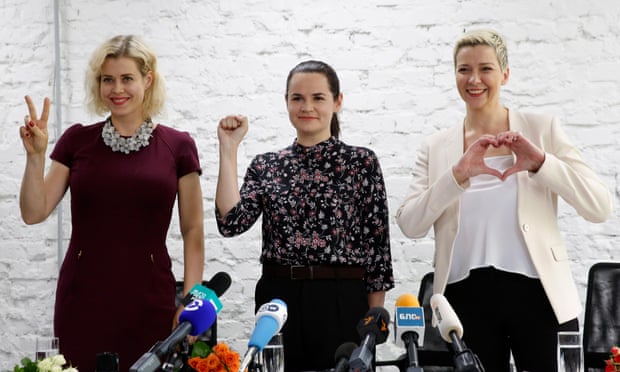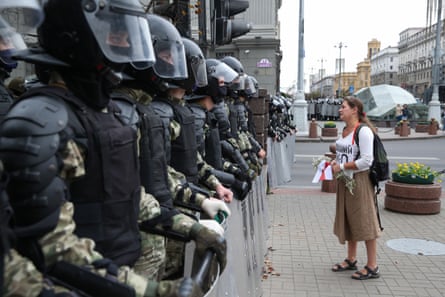The Belarusian opposition figure Maria Kolesnikova ripped up her passport in order to avoid being deported from her own country, according to a Ukrainian minister and media reports.
On Monday, masked men kidnapped Kolesnikova from the centre of Minsk and drove her away. Two of her opposition colleagues also vanished. The three activists were later driven to the Alexandrovka border with Ukraine in a car that arrived at about 4am on Tuesday.
Kolesnikova refused to cross the border and deliberately ripped up her passport, according to local sources. “When attempting to deport her, she tore her passport and could not be allowed into the territory of Ukraine by border guards,” a source told Interfax-Ukraine agency.
The latest repression against opposition figures in Belarus came as a group of Russian journalists, including the editor-in-chief of Russia Today, Margarita Simonyan, flew into Minsk for Lukashenko’s first interview since he declared a controversial victory in a presidential election a month ago.
Russian president Vladimir Putin has promised to send a contingent of special forces to Belarus to prop up Lukashenko if necessary, and is due receive the embattled Belarusian leader in Moscow for talks in the coming days.
Roman Babayan, one of the Russian journalists at the interview, wrote on Telegram that Lukashenko said he will not step down, saying his supporters would be attacked, but he did acknowledge that he may have overstayed his welcome after 26 years in power. “I may have sat in the president’s chair a little too long,” he said, according to a quote tweeted by Russia Today.
Lukashenko also ruled out dialogue with a coordination council, set up by the opposition, of which Kolesnikova is one of a seven-person presidium. Authorities have been systematically tageting its leaders in recent weeks.
Ukraine’s deputy interior minister, Anton Gerashchenko, posted on Facebook that Kolesnikova had successfully prevented “a forcible expulsion from her native country”. “It wasn’t a voluntary trip,” he wrote, calling Kolesnikova “this brave woman”.
The activists with her – Anton Rodnenkov and Ivan Kravtsov – were in Ukraine, officials in Kyiv confirmed. The Belarus state Belta news agency said Kolesnikova was pushed out of the car, which continued without her across the Ukraine border. Belarusian guards then appear to have recaptured Kolsenikova. The exact sequence of events at the border and her whereabouts were unclear.
“Kolesnikova has now been detained. I can’t say concretely where she is, but she has been detained,” Anton Bychokovsky, a Belarus border guard spokesperson told Reuters. “She was detained in connection with the circumstances in which they [the group] left the territory of Belarus.”
Kolesnikova was a campaign partner of the opposition candidate Svetlana Tikhanovskaya, who claimed victory against the longstanding president, Alexander Lukashenko, in disputed elections on 9 August.
She was seized on Monday along with at least three other members of the coordination council, which was set up to seek a peaceful transfer of power amid widespread rejection of the official election results, which gave 80% of the vote to Lukashenko.
Speaking to the Guardian before her kidnapping, Kolesnikova said her civic actions were not part of a political programme. “I just want to do it as a citizen,” she said. She mentioned harassment from the authorities including being followed and minibuses “lurking outside” her campaign headquarters.
Kolesnikova added: “I am not paying attention because if I was going to pay attention I would have left [Belarus] three months ago. I made a decision in May [to stay]. I have no illusions about the kind of country in which I’ve made that decision.”
Germany and Britain have demanded answers over Kolesnikova’s whereabouts. The British foreign secretary, Dominic Raab, tweeted: “Seriously concerned for the welfare of Maria Kolesnikova in Belarus. Lukashenko’s regime must make her safe return their highest priority. The regime must cease brutalising protesters, release political prisoners and begin dialogue with the opposition.”
Quick GuideWhere are they now? The Belarusian women who opposed Lukashenko
Show

Svetlana Tikhanovskaya
Initially a stand-in for her husband, a popular blogger barred from running and jailed by the authorities, Svetlana Tikhanovskaya became the main opposition candidate to the Belarusian leader, Alexander Lukashenko, as part of an all-female opposition campaign spearheaded by herself, Maria Kolesnikova and Veronika Tsepkalo.
She fled to neighbouring Lithuania in early August, from where she posted a video indicating she had faced an ultimatum involving her family.
In September, in a video appearance before the European parliament’s foreign affairs committee, she vowed that the country’s movement for democratic change would not give up, even in the face of continued intimidation and violence from Lukashenko's regime.
Veronika Tsepkalo
A former Microsoft employee, she was the campaign head for her husband Valery Tsepkalo before he was forced to flee with the couple's children to Moscow before the election. Having campaigned alongside Tikhanovskaya and Kolesnikova, she joined him there on the day of the election.
Apart from a one-day stopover in Belarus, when she says she was threatened with jail, she has remained in exile in Moscow. She told a radio interviewer in early August "I think I can do more being in Moscow, being free, and being able to speak up for Belarus' people to the international community."
Maria Kolesnikova
Kolesnikova had been head of the presidential campaign for another opposition politician, Viktor Babariko, also barred from the elections and jailed by the government. She was the only one of the three women to remain in Belarus in the aftermath of the disputed August election.
On 7 September, it was reported she was abducted by unidentified masked men from the street in the capital, Minsk. Kolesnikova’s press aide, Anton Rodnenkov, confirmed her abduction to the media, then reportedly vanished himself about 40 minutes later. According to a Ukrainian minister, Kolesnikova then ripped up her passport at the Belarus-Ukraine border in order to frustrate attempts to deport her. She is currently being held in Minsk.
She had announced on 31 August she was forming a new political party, Together.
Germany’s foreign minister, Heiko Maas, demanded “clarity on the whereabouts and the release of all political prisoners in Belarus”.
The European Union also led calls for Belarus to immediately release more than 600 people arrested during protests against the regime.
The interior ministry said 633 people were detained on Sunday for illegal mass gatherings, one of the largest waves of arrests since the early days of the demonstrations.
“The EU expects the Belarusian authorities to ensure the immediate release of all detained on political grounds before and after the falsified 9 August presidential elections,” its diplomatic head, Josep Borrell, said. “The EU will impose sanctions on individuals responsible for violence, repression and falsification of election results.”

Canada’s foreign minister, François-Philippe Champagne, called for the release of people detained, including opposition members and journalists. “The most recent arbitrary arrests of leading opposition voices and acts of repression are unacceptable,” he said.
Tikhanovskaya, Lukashenko’s main rival who left the country under pressure from the authorities and was granted refuge in EU member Lithuania, said in a statement: “The more they try to scare us, the more people will take to the streets.”
The disputed election has sparked large demonstrations in the ex-Soviet country of more than 9 million people on Russia’s western borders, in an unprecedented challenge to Lukashenko.
On Sunday, more than 100,000 people marched on the president’s residence calling on him to quit. Gangs of pro-government thugs beat up protesters on their way home.
The masked men who snatched Kolesnikova on Monday drove her away in an unmarked minivan in what appeared to be part of a targeted attempt by the authorities to wipe out the protest movement. It was unclear who abducted Kolesnikova.
Her colleague Rodnenkov reportedly disappeared about 40 minutes after confirming Kolesnikova had gone missing. Police in Minsk were cited by Russia’s Interfax news agency as saying they had not detained her.

Before the election Kolesnikova had joined forces with Tikhanovskaya and with Veronika Tsepkalo, who has also since left the country. Another leading activist, Olga Kovalkova, arrived in Poland on Saturday, saying she had been told she would face arrest if she stayed in Belarus.